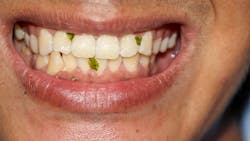Noncompliant patients: Not all patients share the same motivation about dental care
Dear Dianne,
I usually enjoy my work, but I really get frustrated with patients who have crummy oral hygiene. Some of these patients are people I've seen several times. Maybe it's just my temperament, but I actually get angry when people come in with food caked all over their teeth. It just ruins my day! I mean, how can these people stand their own mouths?
I go over and over and over hygiene with these patients, but it doesn't seem to do any good. I feel like I'm wasting my time, and they are wasting their money if they won't brush properly.
Then I started thinking that maybe my approach is wrong, especially when my coworker shared with me that a patient I had formerly seen complained to her that I'd "fussed" at her. So, what am I supposed to do? Am I supposed to just ignore poor oral hygiene? I need help with how to approach noncompliant patients!
Whitney, RDH
Dear Whitney,
I know the feeling well. It can begin before you seat the patient. You see Mr. Smutmouth on your schedule, and you groan inwardly. You know you'll have to wade through a swamp of soft debris before you find his teeth. It's enough to make some hygienists gag.
One of my worst memories was a patient who ate sardines and crackers before his dental visit. He sat down in my chair and asked if he could have some mouthwash. As he spoke, he held his hand in front of his mouth. After he rinsed, he told me that our office had called and asked if he would come in that day rather than two days later. (Evidently, our front desk brought him in early to fill a cancellation.) When he opened wide, the smell that burst forth was that of mouthwash and rotten fish. Waves of nausea swept over me, and I had to rush from the chair to keep him from hearing me gag. After I regained my composure, I went back and completed the patient. I really don't know how I did it, but I made it through somehow. The patient apologized to me afterward, and I brushed it off as nothing, that we appreciated his willingness to come in on short notice . . . right! To this day, I cannot stand the smell of sardines.
Part of every hygienist's training is learning the importance of good oral hygiene and how to communicate hygiene techniques with patients. Oral hygiene instruction is "branded" into the minds of dental hygienists, so much so, that when patients are noncompliant, we feel like we've failed. We feel that if we are not able to drag patients up to some preconceived notion of hygiene mastery, we've failed at communicating effectively.
While it is true that learning to be a good communicator is a lifetime effort, the fact of the matter is that we can come to the point where we actually take it personally when a patient is noncompliant. That may be your issue, so here's the solution: get over it.
I learned this lesson well from a long-time patient several years ago. He was a nice, friendly senior citizen who had the worst oral hygiene I'd ever seen in a human mouth. The first time I saw him, I gave him my very best home-care spiel. I demonstrated proper brushing on a typodont, and then I put the brush in his mouth and guided him gently on the right technique. I felt confident he would look much better on his next visit. Fast forward six months and at his return visit, he didn't look like he'd even picked up a toothbrush during that time. I really wanted to get on his case (or get in his face—whatever it took), but he was such a nice, friendly old guy that I began to feel sorry for him. He often wanted to talk about his deceased wife and his grandchildren, and home care was (evidently) the last thing on his mind. The kind, old gentleman was my patient for 10 years, and he never changed.
However, something did change—me! I came to the realization that not very good is the best that some people will ever achieve with their personal oral hygiene. I realized if I berated him every time he came in, he would come to a point where he would dread seeing me and might even quit coming, which would be the worst possible outcome. I came to see him as "needy." He certainly needed my services, and I wanted him to look forward to our visits. I wanted him to like me.
It's a good thing when patients like us. When they like us, they are less likely to break appointments, complain about our fees, or sue us (this applies to doctors and hygienists).
So when I recommended to my patient that it would be better if I saw him more often; i.e., every four months instead of six, he was fine with that. If patients like and trust us, they are usually amenable to just about anything we recommend in the way of treatment.
Interestingly, this particular patient with the worst hygiene in the universe did not have periodontitis. He did have mild gingivitis, but the bone around his teeth was fine. If home care is such an important issue in the prevention of periodontitis, this patient should have had frank periodontitis. The reason he did not develop periodontitis in the face of atrocious oral hygiene is simple—he was not susceptible. There has to be a susceptible host in order to develop periodontitis. Not all gingivitis progresses to periodontitis.
It is likely that you have set high standards of care for your patients. That is not a bad thing, but when the standards you have set are not attainable, for whatever reason, by your patient, you have to be flexible enough to say, "OK, this is not working. How can I customize home care for this patient to something he or she can do and be successful at?"
Just realize that what we consider "ideal" is not always attainable by the patient. In fact, over the past decade, there have been some high-level studies that even question some of our long-held beliefs on home-care techniques, such as flossing. For example, a meta-analysis titled "The efficacy of dental floss in addition to a toothbrush on plaque and parameters of gingival inflammation" published in 2008 in the International Journal of Dental Hygiene came to these conclusions: "Routine instruction of flossing for gingivitis patients is not supported by scientific evidence. The dental professional should determine on an individual basis whether high-quality flossing is an achievable goal."
My advice to you is to lighten up on yourself, and face the reality that your patients do not all possess the same motivations, desires, and levels of manual dexterity to do the things you ask them to do. Excellent oral hygiene is simply not a priority for some people, no matter what we think. And it's those patients who are the most in need of your services. Help them where they are, and remember, your place is not to berate but to encourage.
All the best,
Dianne
Editor's note: This content was originally published in 2016 and has been updated as of August 2025.
About the Author
Dianne Glasscoe Watterson, MBA, RDH
DIANNE GLASSCOE WATTERSON, MBA, RDH, is a consultant, speaker, and author. She helps good practices become better through practical analysis and teleconsulting. Visit her website at wattersonspeaks.com. For consulting or speaking inquiries, contact Watterson at [email protected] or call (336) 472-3515.
Updated June 30, 2020

